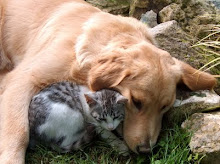
I've been hearing some political pundits ask the question of late "Why are Americans becoming more outspokenly critical, snarky, and nasty in their opposition to a view other than their own?" A variety of opinions are bandied about: perhaps it is the popularization of shows featuring the likes of Rush Limbaugh, Gordan Ramsay and Simon Cowell; perhaps it's a racist response to our President; perhaps it's the fact that people can easily and anonymously put their opinions forth on the internet and find power in others who also like to criticize and rant; perhaps it is because the age of journalism ethics is over. I don't claim to have the answers but my thought is "Oh, America is starting to act a bit more like animal people." ("Animal people" meaning those people who work or volunteer helping out companion animals.)
Now before you animal people get highly offended, I am a proud "Animal Person" myself and for years have been making the claim that animal people are no more "crazy" than other people. Why would I even have to make that claim? Because it is true that, as a movement, animal welfare has the reputation for attracting "crazy" people. My own opinion on this is I do believe that persons who may have some social anxieties (like me) are attracted to this movement because, as I hear over and over again "I like animals more than I like people." Well sure, animals can never say things they may regret later; animals cannot offend, criticize, or belittle....it sure does make them easy to love. The problem is, you can only do so much to help animals without engaging and working closely with people.
I do believe that the rest of the population can learn a lesson from us animal people who haven't been getting along with each other for years before Rush Limbaugh. The lesson is you don't have to agree with someone but if you really want to advance your cause, you'd better learn to deal respectfully with those holding opposing views. And you'd better learn to prove your point using something more than hollow criticisms and a holier-than-thou attitude.
Recently I received an anonymous letter from someone who felt No More Homeless Pets in Utah was "evil" for spaying pregnant animals, accusing us of having no respect for life. A paragraph later this person then proceeded to criticize us for NOT killing adult feral cats. Apparently the value of life, in their view, was only afforded the unborn cats rather than cats already alive. My first response was "well, this person is freaking crazy," but then when I really thought about it I found I could have compassion for their viewpoint. I didn't agree with it but I could respect it. However I could not respect the malicious tone nor abide the angry rant. Had they signed the letter I could have replied thus:
None of us enjoy the thought of spaying a pregnant animal, and certainly we are all striving for the day in which we can not only save the already born, but the unborn as well. Sadly, that day has not come, and so we must go into shelters, choosing some and leaving others who will inevitably be euthanized. It is not the shelter’s fault, it is not our fault, and we do the best we can to rescue as many as we can. In light of that dilemma we do spay pregnant animals. We certainly respect other organizations who choose to let a late-term pregnant animal have it’s babies and care for them until they are weaned, fix them along with the mother before adoption and responsibly place them. They may use up resources that could have been used to save double the number of animals already in shelters and already born, but we respect their important niche in animal welfare. We don’t criticize them simply because they choose to save lives in a way different than we do.
As long as animals are dying in shelters, this ethical dilemma will be present. Who do we save? Having mutual respect for shelter workers, veterinarians, breed enthusiasts and other rescue agencies all implementing various life-saving programs close to their own hearts is critical if we want to work together to solve this problem.
Holly Sizemore
Executive Director


No comments:
Post a Comment